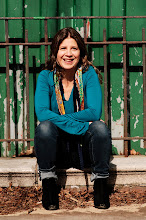I stand between my father and mother in the searing Louisiana heat, watching my grandmother’s casket—silver blue, a color she would have admired—be lowered into the ground. I am crying, quietly, my face crumpling in a way I’ve hated since I hit puberty and began a mental list of my unattractive qualities. (Face crumpling, check.) Despite my silence, my father notices. He leans down and whispers, “You really liked her, didn’t you?”
For the record, it’s a real question. He’s truly curious. No one liked my grandmother. Not even the array of Snopes-like relatives—some of them clad in overalls, one in a polyester blue suit that brought John Travolta of a certain era to mind—who’d taken the trouble to pay their respects when her body had been on display in DeRidder’s only funeral home. (My favorite had been an old fellow, clearly not all there, who’d peered into the casket like someone perusing a freezer compartment for their favorite ice cream, before announcing, in loud tones, that he didn’t know her.)
Anyway. It had nothing to do with the fact that she was old. This isn’t a story of a likeable person consumed, to the point of unrecognizability, by dementia. She had, apparently, always been odd, something I knew about mostly from stories. I did have some real experience with it, though. There was the way she’d regulary sent us all news clippings echoing our worst nightmares—for me, an article about a girl who’d been raped and murdred while jogging alone at night; for my mother, one about a doctor who’d had two families—with chirpy little notes (“Thought you’d be interested!”) attached.
There was the pillow—a pink satin bridge meant for neck support—that she insisted on sleeping on so that her head never hit the bed and mussed her falsely flaxen hair, which she had fashioned into an elaborate twist once a week at the beauty salon. (Imagine Tippy Hedron in “The Birds,” with a little more height and perhaps a seashell sprayed a pastel hue adorning it, for good measure.) There were the forties style negligles, inappropriate for someone—anyone—whose girdle turned her midsection into a drum. There were the tottery high heels, the languid gestures, and the sugary, sweet southern drawl—almost baby talk—that became throatier and quite adult when she was angry.
And she was, often, angry. There were the tantrums, reserved for her hapless, amiable husbands, but earlier in her life, aimed at my mother, her daughter, who still could not forgive her. And there was the time she’d called our house, after my brother died, wanting to know the dates of his birth and death so she could play the lottery. That incident had been the most personal for me. At fourteen, I still didn’t always know when adults were within their rights, behavior-wise. This, I knew, was over the line.
But still. I liked her. Or was fascinated by her. Or both. She may, admittedly, have been hard to love, but it was hard to look away from her, too. Until she died, I’d been content enough to relegate her to the category of family joke, which was the way everyone else—everyone being my parents, and when he was alive, my brother—liked it. Mention of her name could always elicit an eye-roll and a good anecdote. But, too late, I wanted to understand her. Who she was, or rather why she was the way she was.
She’d been diagnosed with pancreatic cancer only three months earlier. It had all happened so fast that I’d never really got to spend time with her to really understand who she was, or what her life had really been like. Once, perhaps tellingly, she’d sent us a clay sculpture of a boat, about a foot in length. In it, twisted in paroxysms of agony that bring Dante’s Inferno to mind, were seated a series of tiny figures in front of equally tiny oars. The name of the piece: “We’re all in this boat together.”
I’d always wondered what the boat looked like from her point of view. Now it seemed I’d never know.
MineMineMine!
13 years ago




No comments:
Post a Comment